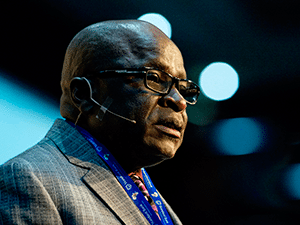
[miningmx.com] – SOUTH African mines minister, Ngoako Ramatlhodi, said he was mindful the Mineral & Petroleum Resources Amendment bill was the outcome of negotiations with the mining sector, but he stopped short of guaranteeing that no further changes would be made to mining related amendments.
“When a bill goes back to Parliament, it means it can be debated,” said Ramatlhodi. “As the minister responsible, I am alive to fact that certain provisions were negotiated over a period of time, and will bear it in mind as we go forward,” he said. He was speaking at the IHS Energy South African Coal Exports Conference 2015.
The amendments to the Mineral & Petroleum Resources Development Act (MPRDA) were referred back to Parliament in January after Ramatlhodi requested it, initially on the basis that the preparation of the bill through Parliament had been unconstitutional.
Robert Besseling, principal analyst for IHS, said it was likely that Ramatlhodi’s primary concern was to ensure that the oil and gas provisions in the MPRDA were removed and treated in separate legislation.
“He probably wants to rush the mining related amendments through but whether he has the political clout to do that in the African National Congress is debatable,” Besseling said.
Mike Teke, president of the Chamber of Mines, told Miningmx recently that the amendments in the bill had been negotiated “in good faith”. He said he was heartened by recent comments from the minister, but added: “… we will have to wait and see”.
Said Ramatlhodi: “We see a need to provide clarity on the legal regime to give assurance to investors who wish to put money into the sector”. This comes as prices for export coal have slumped by more than half in two years.
Ramatlhodi said a recent meeting of the Mining Industry Growth and Development Task Team, known as MIGDETT, had decided to establish a focus group for the coal industry in order to establish a national policy.
“A coal resource study shows South Africa has 66 billion tonnes that can be economically extracted and last for well over a century.
“In short- to medium-term, the development of this resource will require R100bn in investment for extraction and for multi-purpose infrastructure and logistics,” he said.
Ramatlhodi also said he was worried about the financial effects of the downturn in the coal price since 2012.
“We are concerned about the extreme volatility in the coal price as it has a direct effect on the profitability of companies, and effect on the fiscus”. Revenue losses in the coal industry over the last 12 months totalled R23bn.
Ramatlhodi also said that the Department of Mineral Resources (DMR) was from December 8 committed to processing mining and prospecting applications in 300 days.
“It has been done,” he said of the implementation of a new process in which mining companies are now required to apply for all necessary mining and prospecting approvals through the DMR – a process that would take less than a year.








